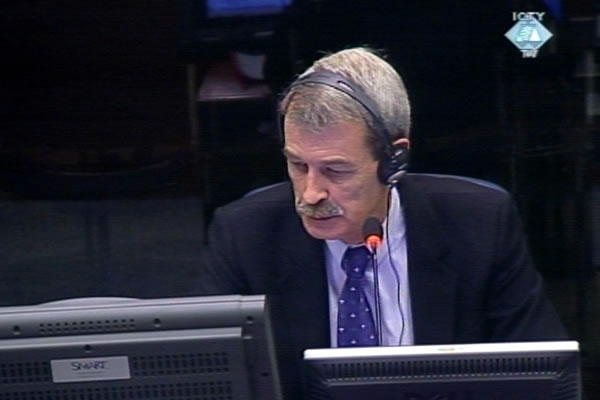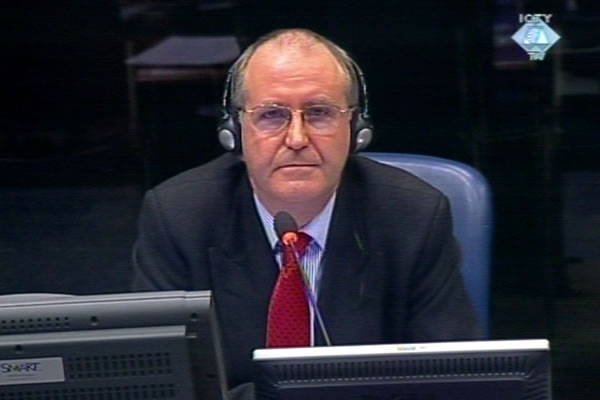Home
KARADZIC: ‘SERBS PROVED THEIR NOBILITY’ IN SREBRENICA
In his cross-examination of Robert Franken Radovan Karadzic showed an interview in which he said ‘Serbs proved their nobility in Srebrenica’ and civilians were given a choice: leave or remain in Srebrenica. The witness replied that in his view, the choice was merely ‘theoretical’. Pyers Tucker, General Philip Morillon’s aide de camp, began his evidence later today
 Robert Franken, witness at the Radovan Karadzic trial
Robert Franken, witness at the Radovan Karadzic trial Radovan Karadzic continued his cross-examination of Robert Franken, former deputy commander of the UN Dutch Battalion. Karadzic put it to the witness that the peace-keepers in Srebrenica contravened their mandate after 10 July 1995. As Karadzic put it, the UN was no longer ‘impartial’ but became a side ‘in the conflict’.
Franken agreed with Karadzic’s claim, explaining this was ‘the consequence of the fact that the VRS attacked UNPROFOR’. Replying to Karadzic, the witness said that on 10 July 1995 he received an order to ‘actively defend Srebrenica using all available assets’. Franken relayed the order to his subordinate soldiers, instructing them to defend the enclave from their positions.
Karadzic also argued that the BH Army in the spring of 1995 intended to ‘conquer the entire Podrinje area’. This resulted in a series of attacks from the enclave on the Serb territory. Franken didn’t deny that the Muslims forces attacked Serb positions around the enclave. The witness was aware that Muslims had not surrendered all their weapons. It was his impression that the troops in the enclave were organized in a division. This was difficult to establish because soldiers were billeted in houses, not in the barracks, Franken noted.
The Dutch lieutenant colonel stuck to his claim that Ratko Mladic demanded that the civilians be evacuated from Srebrenica to Kladanj. Franken said he found it strange that the buses started arriving in the base mere minutes after the meeting at which the evacuation was arranged, in light of the fact that Mladic has asked the UN to take care of the transportation.
Karadzic played a recording of an interview he gave to the Serb television immediately after the VRS overran Srebrenica. In the interview, Karadzic says Srebrenica has ‘proven the Serbs’ nobility’. ‘Not a single civilian was hurt’, he says and then adds that the people were offered transportation to Tuzla, but those who wanted could stay in the town as long as they were willing to accept Republika Srpska as their state.
The accused used this to corroborate his claim that the population was given a choice: leave or remain. Franken thinks the choice was only ‘theoretical’; ‘in practice’ they were forced to leave. In the re-examination, the prosecutor used an intercepted conversation that took place on 12 July 1995. In the conversation, General Mladic says that everybody will be evacuated from Srebrenica, ‘those who want it and those who don’t’.
After Robert Franken completed his evidence, the prosecution called British colonel Pyers Tucker. The Trial Chamber rejected Karadzic’s request to exclude parts dealing with the crimes committed by the Serb forces in Srebrenica in 1993 from Tucker’s written statement, which was thus admitted into evidence. It is based on Tucker’s previous testimony at the trials of Galic, Oric and Perisic.
From October 1992 to March 1993, Tucker served as General Philip Morillon aide de camp. According to the summary of Tucker’s written statement, parts of his evidence deal with the ‘terror campaign and intimidation’ of the citizens of Sarajevo by the Serb forces and his observations during Morillon’s visit to the eastern enclaves, including Konjevic Polje and Srebrenica, when the offensive in March 1993 was at its height. Tucker’s testimony will continue tomorrow.
Photos
Linked Reports
- Case : Karadzic
- 2012-01-16 SREBRENICA WAS CAPTURED ‘RAMBO STYLE’
- 2012-01-13 KARADZIC 'WATCHED PANDUREVIC'S BACK'
- 2012-01-12 WITNESS: SERB OFFICERS TOLD US THEY WANTED SREBRENICA FOR THEMSELVES
- 2012-01-18 WHO’S RESPONSIBLE FOR THE BAD IMAGE OF KARADZIC’S TROOPS IN WESTERN MEDIA?
- 2012-01-20 KARADZIC’S MOTION TO RECALL 12 ‘MUNICIPALITY WITNESSES’ REJECTED
- 2012-01-24 YEARS OF HUNGER AND DEATH IN SREBRENICA

